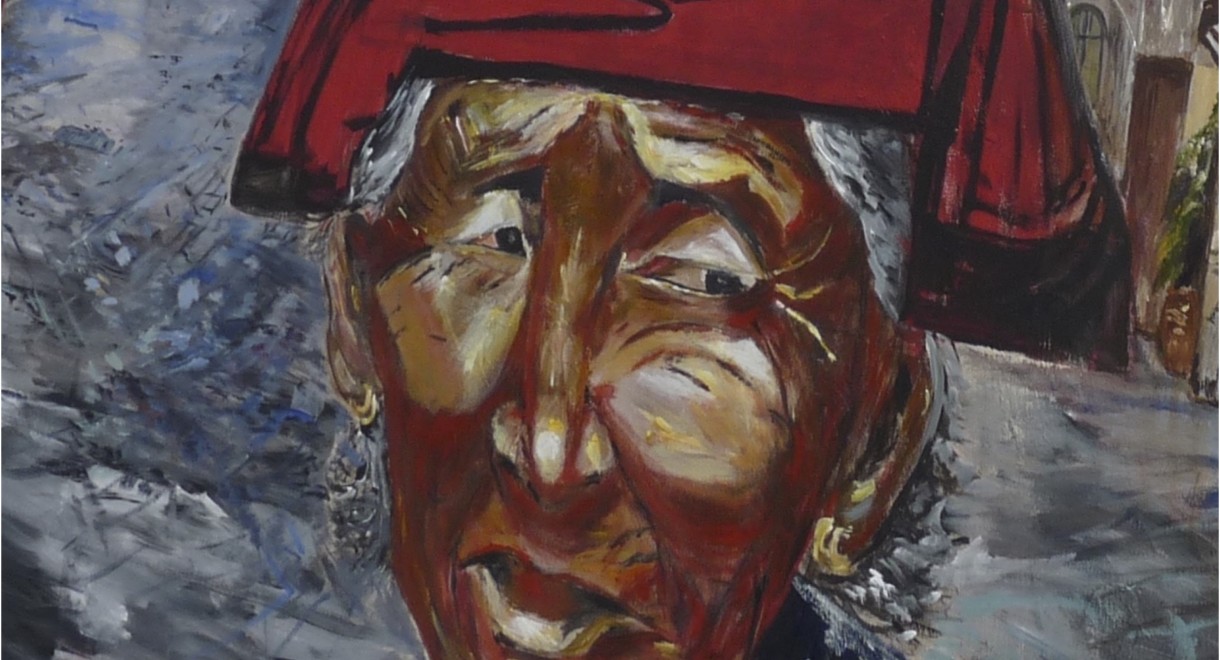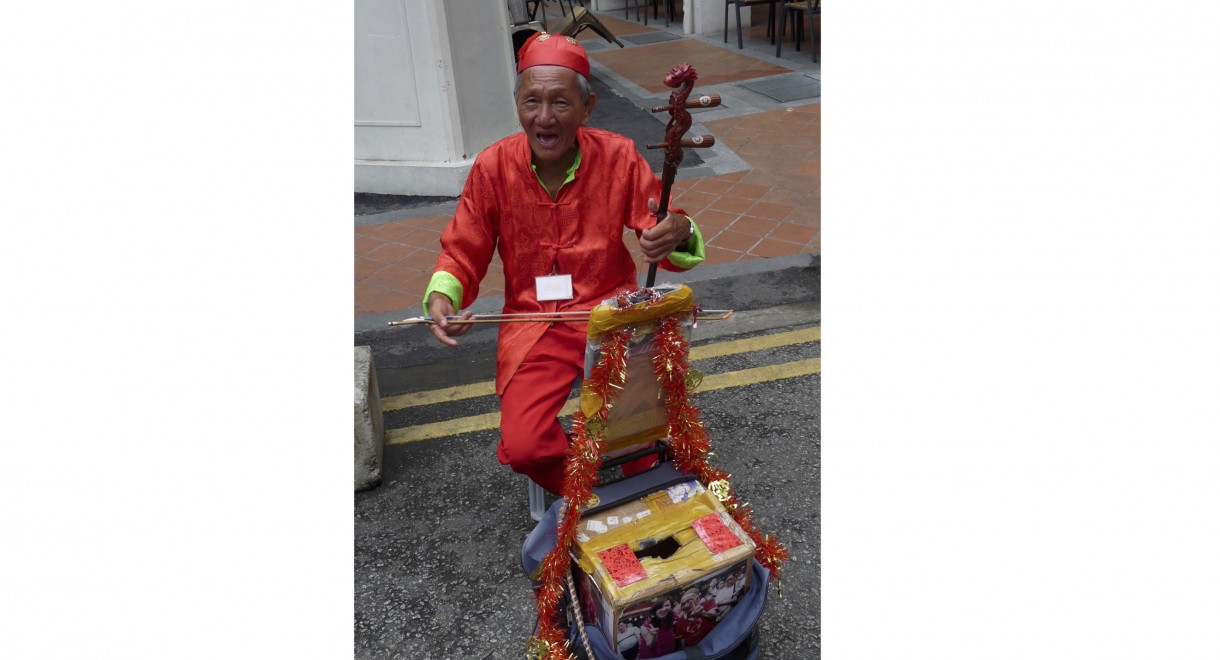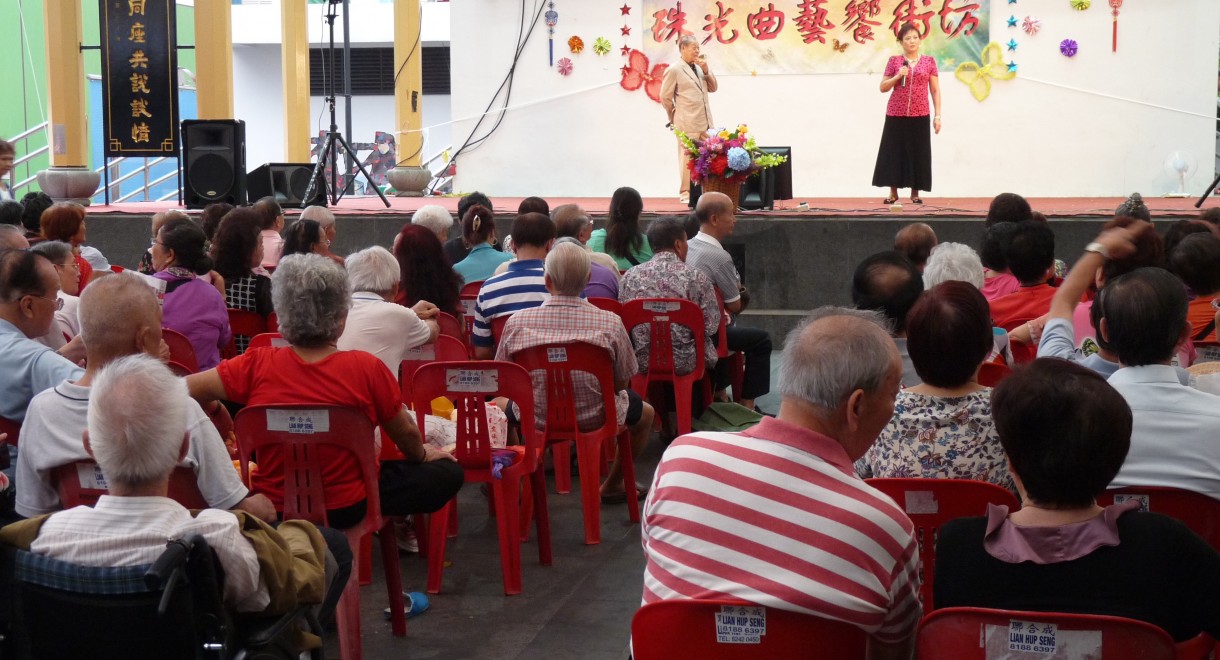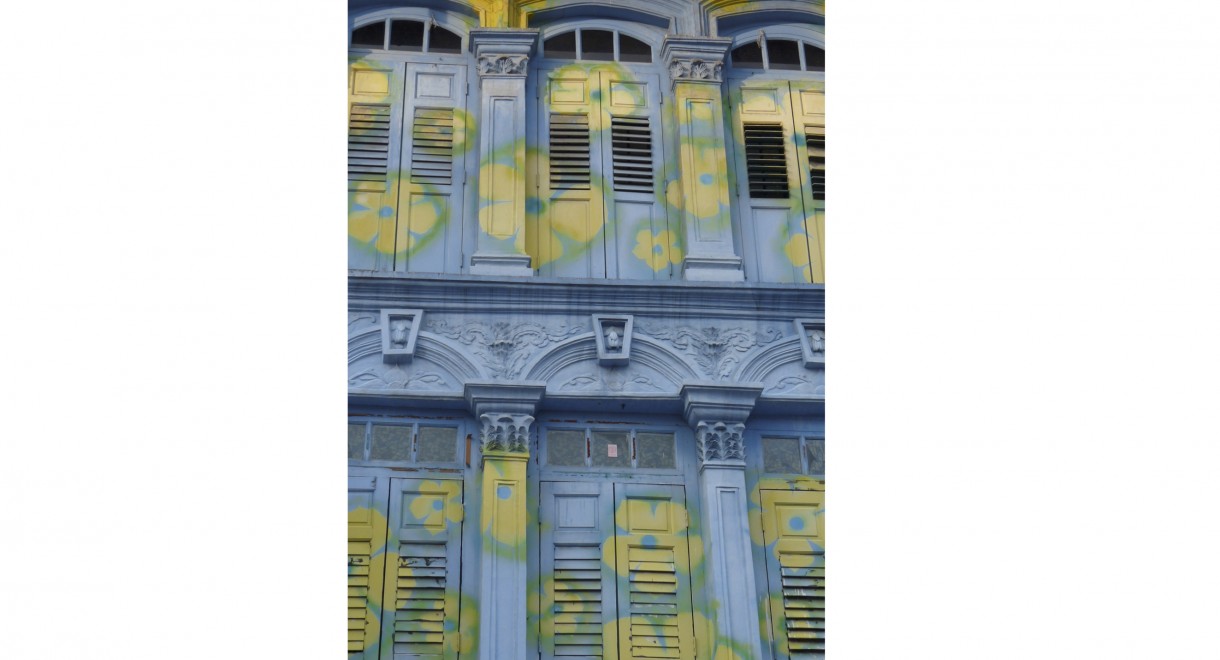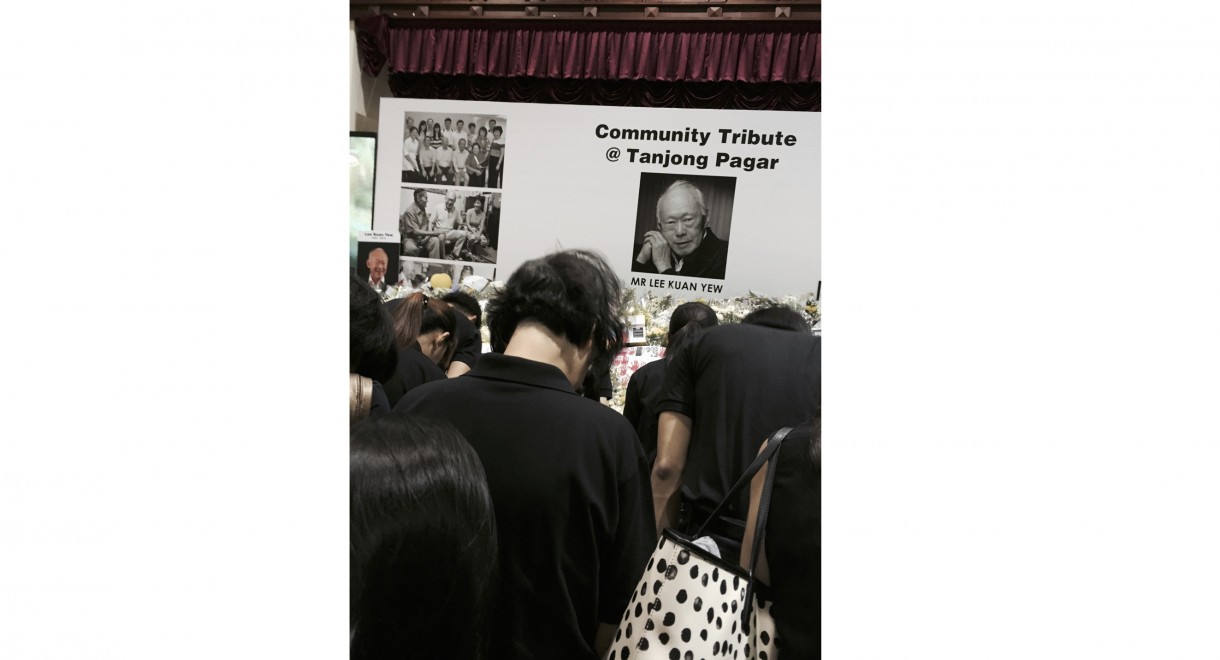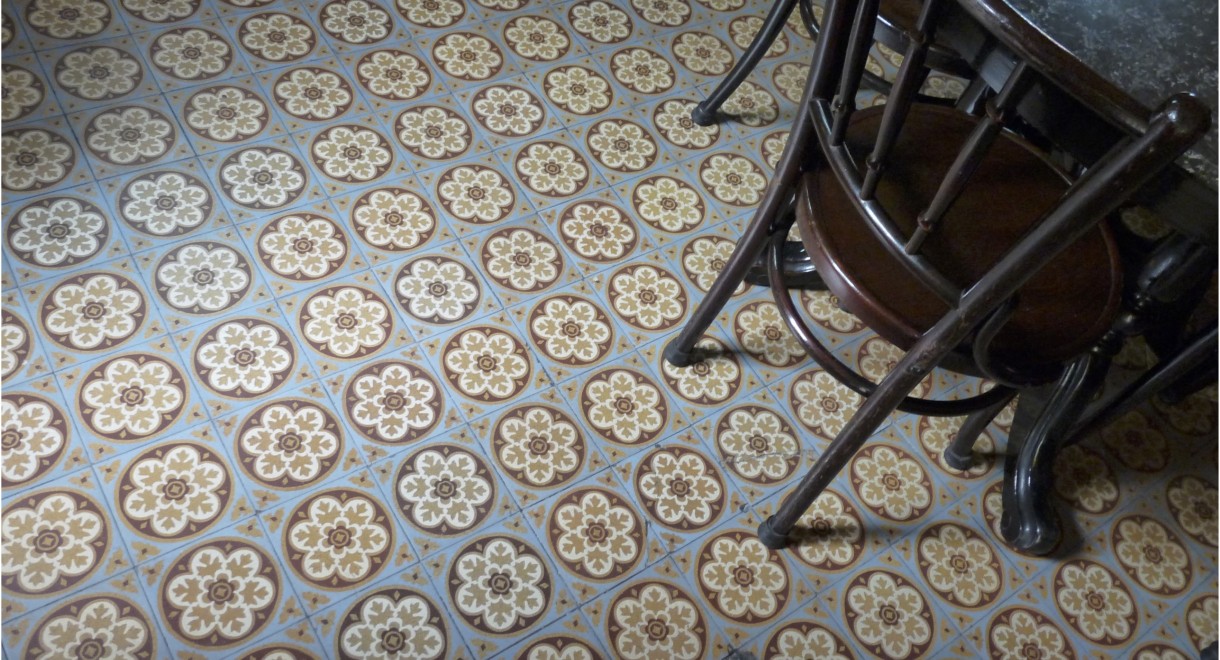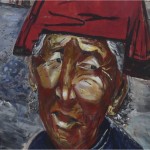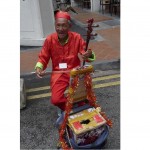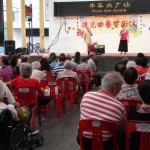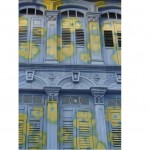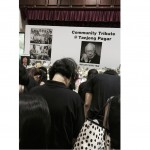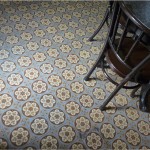Ang Kim Geok (洪金玉)
I am a civil servant in my 40s. Picturing Chinatown has been a truly exciting and enriching journey for a photography and heritage enthusiast like me. It has provided me the opportunity to self-reflect and look at Chinatown through a new lens: the rich history, the beautiful architecture and buildings, the traditional businesses, the interesting people, the various types of religious institutions, the clan associations, and not forgetting the glorious food! 我是一名40多岁的公务员。对热爱摄影与传统文化的我而言,参与“光影纪实-牛车水旧事新说”活动无疑是令人振奋和充实的体验。它让我有机会在反观自我的同时,也从一个新的角度认识牛车水:深厚的历史底蕴、别具特色的建筑、传统的行业、各色各样的人物、不同的宗教场所、会馆;还有那令人难忘的美食。
May 9, 2015
Picturing Positive Ageing In Chinatown “乐”在牛车水
What does ageing mean to you and me? Very likely different pictures of ageing come to our minds.
老龄化对你我来说意味着什么?我们脑中浮现的画面应该都不同。
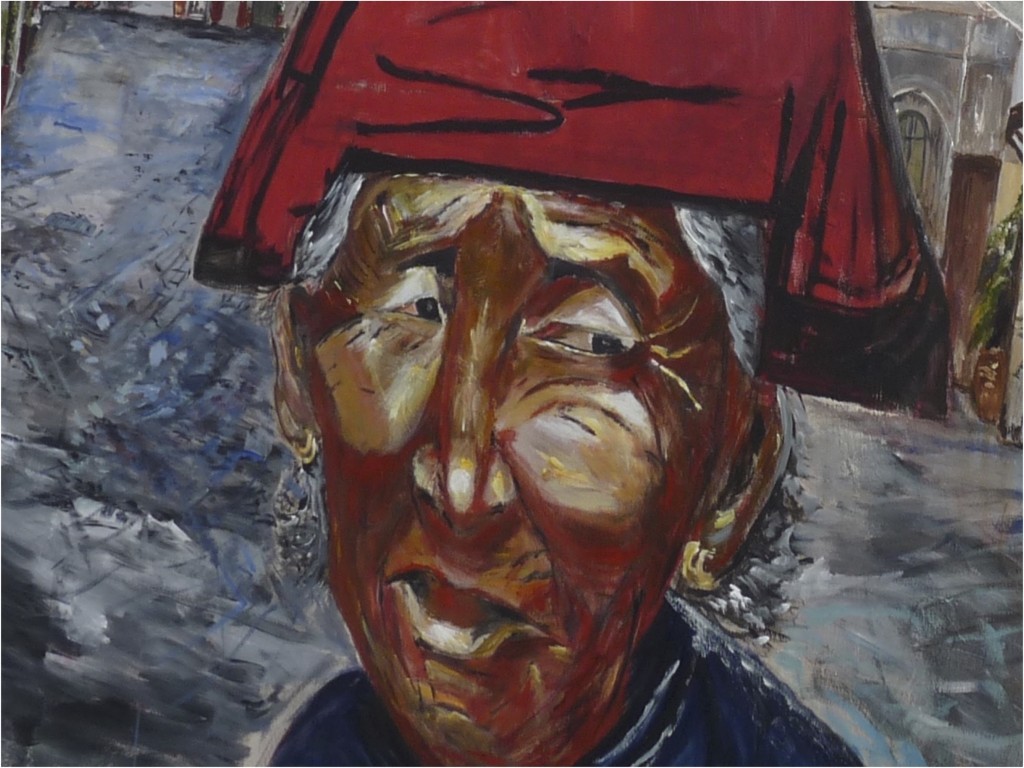
Picture (1): Samsui Women, icons of historical Chinatown
图1:旧牛车水的代表:红头巾
Some people say that the old people in Chinatown are poor, sad, isolated, alienated, lonely and belong to an era long gone by, like the Samsui women, the construction workers, of our pioneer generation. Some may well be, but are they in the majority?
有人说,在牛车水的老人都是穷困、难过、孤独、被孤立的。正如建国一代的建筑工人红头巾一样,他们都属于往事的一部分。当中有些也许,但这是否意味着大部分的老人皆如此?
As an ardent advocate of positive ageing, I set out to find alternative pictures of ageing in Chinatown. Pictures which depict ageing as a positive experience.
身为热心的积极老龄化倡导者,我决定在牛车水寻找老龄化的另一面,使用照片叙述年龄增长的乐趣。
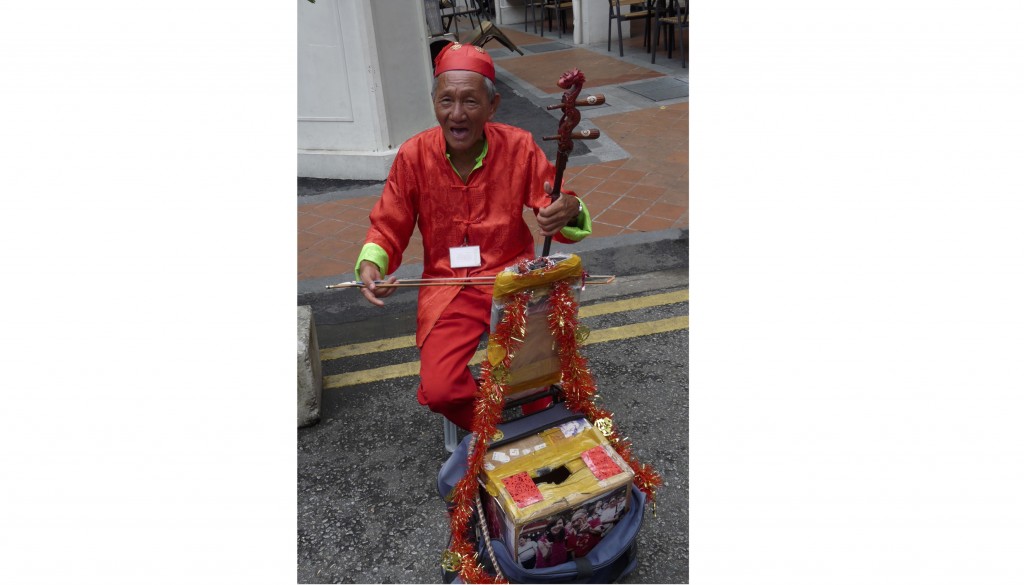
Picture (2): This erhu player always has a cheerful greeting for passers-by
图2:这名二胡表演者时常欢愉地向路人问好
Friendly with an indomitable spirit of cheeriness, I saw an amiable erhu player. He showcases his musical talent not only in Chinatown, but elsewhere as well, so I’ve heard. Unlike other seniors who may shy away from wearing fire-engine red, he does not let his years get in the way.
听说这名爽朗活泼的二胡表演者除了在牛车水巡回以外,也在其他的地方表演呢。长者一般会避开如火红色的抢眼颜色,但对他而言,年龄与衣装没有关联。
Not only does he remain independent by earning his own living, he also brings smiles to the faces of people around him through his contribution of music.
除了自食其力以外,他也通过音乐把欢乐带给身边的人。
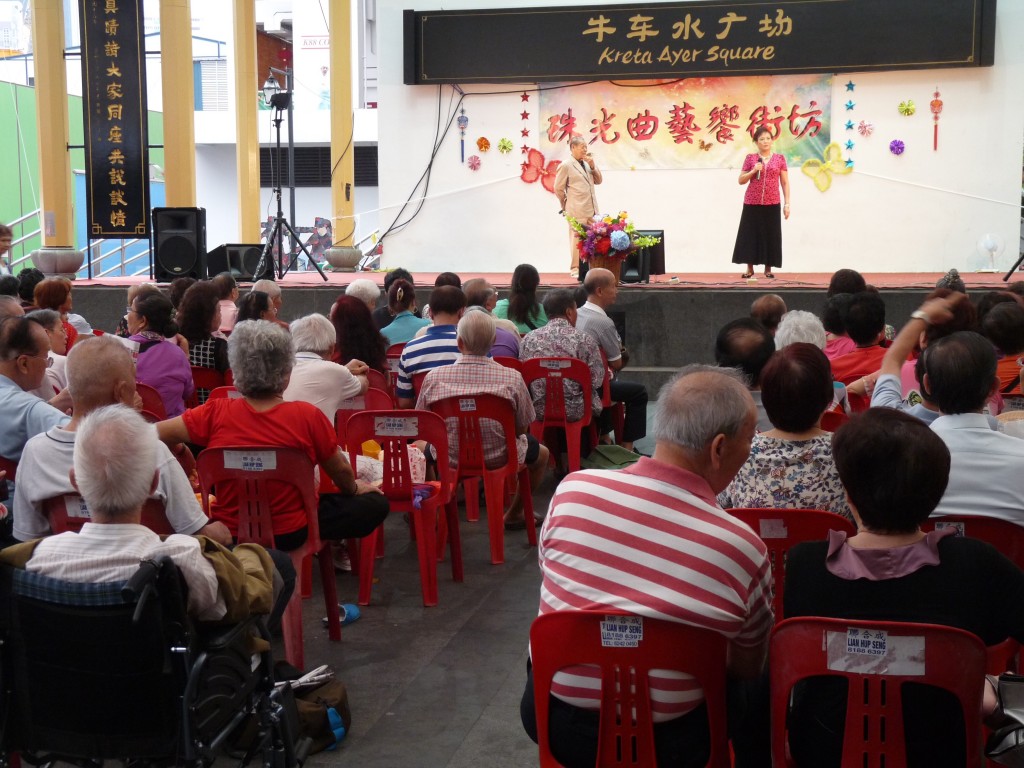
Picture (3): I could hear the sound of the singers’ strong voices from blocks away
图3:在相隔一段距离的地方依然可听见演员们带劲的嗓音
Kreta Ayer Square has much to offer the usually more senior audience. The few weekends I was there, there were concerts taking place, allowing older folk to while their time away in an enriching way. Even wheelchair users were out of their homes and amongst the audience. The two senior Cantonese opera singers, dressed to the nines, are still vocal powerhouses, singing with great stamina.
牛车水广场为乐龄观众提供了不少选项。就在我到访的几个周末里,已经看见了好几场让乐龄消磨时间的表演。难怪连以轮椅代步的老年人都出门,在人群之中观赏表演。在台上的两位粤剧演员宝刀未老,穿着讲究,嗓子依然很好。
Elsewhere near the square is a common sight: a group of intense older men engaging in a battle of wits over a game of Chinese chess. I have often wondered where the older women are in this men’s-only domain. The women are probably chatting with friends, or watching concerts at the square. Ah well, which Ah Mah can break through the stronghold of the Ah Gongs at that spot in Chinatown?
在广场的另一角是你我都熟悉的场景:一群上了年纪的男人聚精会神地关注着一场智慧的拼搏—象棋。我时常在想,在这个男人的专区里,女人在哪里?或许在与朋友聊天,或许正在广场上观赏表演。唉,到底哪个阿嬷能够顺利闯入这个属于阿公在牛车水的地盘呢?
Unlikely. 应该没有吧。
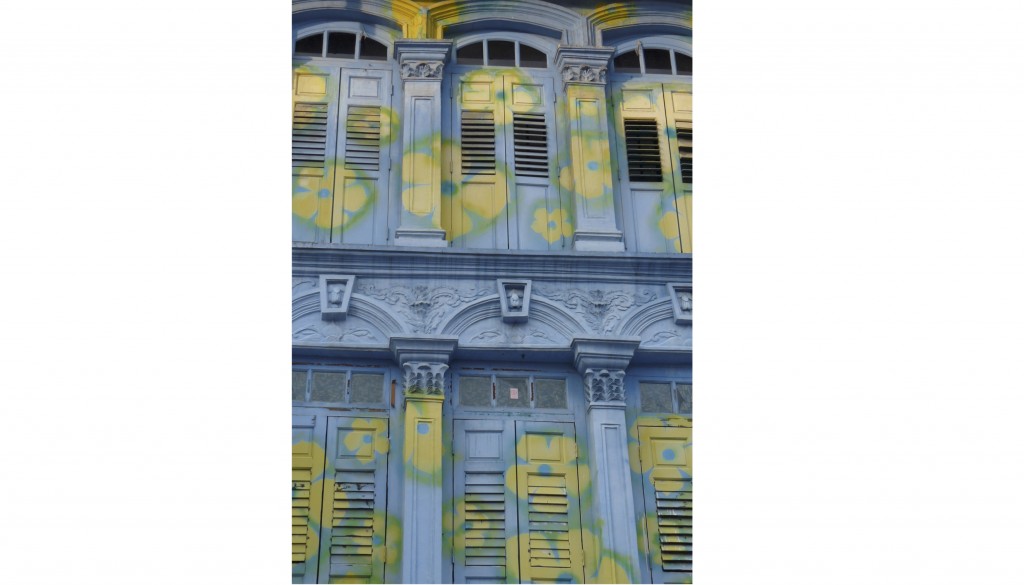
Picture (4): Just as how ageing buildings can be given a new lease of life, we can add quality of life to years, instead of just adding years to seniors’ lives
图4:陈旧的建筑物能被赋予新生命,我们也能在增龄的过程中,将色彩添入生命里
The generations to follow will also benefit from looking beyond the wrinkled exterior to the inner wealth of life experiences and personal stories that seniors can pass to us. As nicely written in a poem by an American senior, Anne Whitlock:
未来的几代人也能受益于领会经岁月摧残的外表底下的人生阅历、乐龄人士流传下来的个人记忆。正如美籍乐龄人士安妮·惠特罗克在诗中所说的:
I like to think that we enrich this city.
We are its old buildings and facades,
but like the weathered walls
of old domaines in southern France,
we harbor vintage wine and cheese.
我认为我们使这座城市更丰富多彩。
我们是她的古老建筑她的外观,
但如同法国南部酿酒园里
经过无数个风花雪月的墙,
我们酝酿着陈年美酒与奶酪。
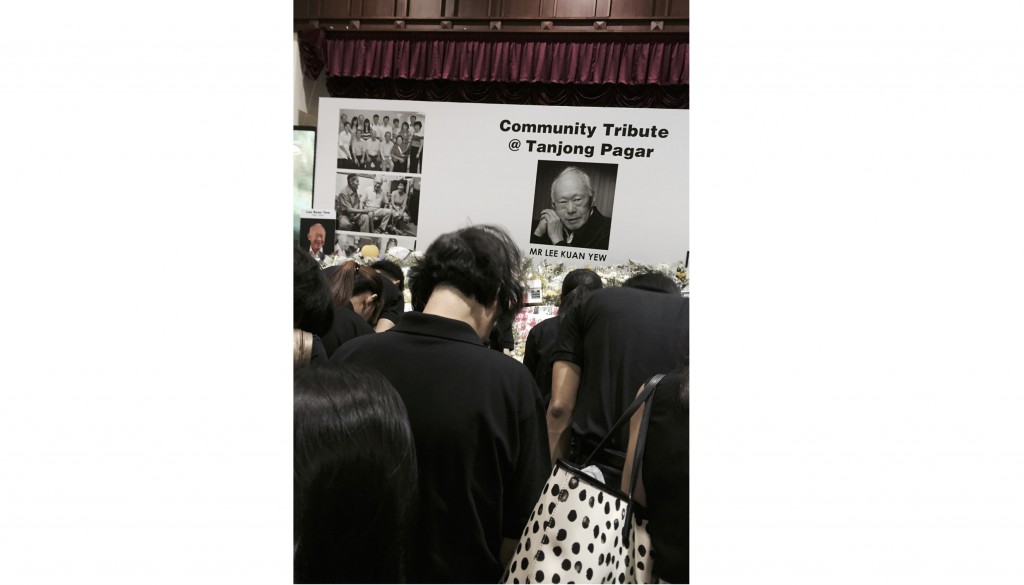
Picture (5): Mr. Lee Lee Kuan Yew: a fine example of lifelong learning, as well as active, productive, successful aging
图5:终生学习;活跃、积极老龄化的代表:李光耀先生
Surely one such vintage wine, which tastes better with age, is the late Mr Lee Kuan Yew. Our former Prime Minister and the Member of Parliament for Tanjong Pagar has served his district in Chinatown for more than half a century. This founding father of modern Singapore was a fine example of lifelong learning, as well as active, productive, and successful ageing. Despite his passing, we will still savour his wine for generations to come. His was a life well lived. He will be fondly remembered for a very long time.
陈年的美酒最香醇,走过无数个岁月的人最了解人生。已故的李光耀先生就是一个好例子。建国总理兼丹戎巴葛集选区议员李光耀先生已为牛车水的居民服务了超过半个世纪。这位建国先驱是名副其实的活跃、终生学习、活跃老龄化的代表。即便他已逝世,未来几代人也将享获他丰收的果实。他的一生是多么的充实。他的一切将长存在后人的记忆里。
During the past few weeks of walking around Chinatown with my camera to capture positive experiences of ageing, I found that the same image of an old person can evoke different feelings and attitudes within people. Given my training in social work, gerontology and my years of working in eldercare, I strive to look for the strengths and potential in seniors. I regard them as unique individuals in their own right. The wider community, more often than not, tends to view and depict ageing in a less positive light.
这几个星期里,在通过镜头捕捉牛车水的积极老龄化时,我发现同样一张老人的照片能在不同人身上勾起不同的情感。身为一名受训于社会服务与老人学,并在老年护理领域拥有多年工作经验的人,我力求揭发年长者的强项与潜力。我将他们视为独特的个体。值得关注的是,不少群众时常将乐龄人士刻画成较负面。
Myths, misconceptions and stereotypes about ageing and seniors abound:
“In general, older people are alike.”
“The majority of seniors are senile and demented.”
“Older adults are unproductive, uncreative, and incompetent, and cannot work as effectively as younger people.”
“The majority of elders are socially isolated and lonely.”
有关老龄化与乐龄人士的一些误解与成见:
“老人家都是大致相同的。”
“大部分老年人都失智、痴呆。”
“年纪大的人没有生产力、没有创意、无能。他们无法与年轻人一样有效率。”
“大部分的年长者孤僻与孤单。”
Seniors are often pictured carrying walking sticks. The increasing number of seniors resulting from population ageing is described as the “Silver Tsunami”—as if the total number of older adults is a destructive force that sweeps and engulfs everyone in its way.
年长人士总是被描绘成扶着拐杖走路的样子。人口的老龄化意味着乐龄人口的增长。有人称之为“银色海啸”,仿佛年长者的数量是足以把人吞噬的一股巨大破坏力。
Such ageism stems from the tendency to regard seniors as debilitated, unworthy of attention, or unsuitable for employment. It is as if when you hit a certain age, your knowledge, skills and experience acquired throughout your life dissipates into thin air! It is as if overnight, your social value and place in society has crashed like the stock market!
对老年人的歧视、对某个年龄层的偏见都源自于年长人士衰弱、不值得受关注、不适合工作等印象。这种论调意味着一生中累积的知识、经验、技能一到了某个年龄就会蒸发!在社会的位置与价值像股市一样一夜间崩溃!
Sadly in meritocratic Singapore, this is still so. The headline for a Straits Times article dated 4 January 2014 states, “Singapore ‘still very much an ageist society’. The paradox is that people want to live a long time, but they do not want to be old or to acknowledge that they are old, as if old age is an undesirable stage of life.
不幸的是,在任人唯贤的新加坡社会里,情况确实是如此。海峡时报在2014年1月4日其中一篇新闻的头条写道:“新加坡‘仍是歧视年龄的社会’”反讽的是,人们想要活得久,但年龄的增长仿佛是令人讨厌的是,大家都不想变老或不想承认自己老。
Singapore is ageing rapidly. In 2030, 1 in 5 persons will be 65 years and above. We need to regard ageing in all its reality with clarity, as a very real part of life. After all, we start to age from the day we are born. Making ageing a positive experience starts with you and me. This requires us to change our perspectives and attitudes towards ageing. We can create a Singapore for all ages, where seniors are accepted socially and their life experiences treasured. We can provide opportunities to harness the potential and continuous contributions of the older population.
新加坡人口的平均年龄正在迅速地增长。到了2030年,每5位人当中就会有1为年龄为65岁以上。我们必须承认老龄化是生活中真实的一部分。毕竟,我们从一出生的那一天起,年龄就已经开始增长。你我可以使老龄化成为一个愉快的体验。我们只需调整我们的观点与心态拥抱老龄化。我们可以打造一个适合各年龄层的新加坡,让年长者被接受,重视他们的人生阅历。我们可以提供机会,让这群年纪较大的人发挥他们的潜力,继续做出贡献。
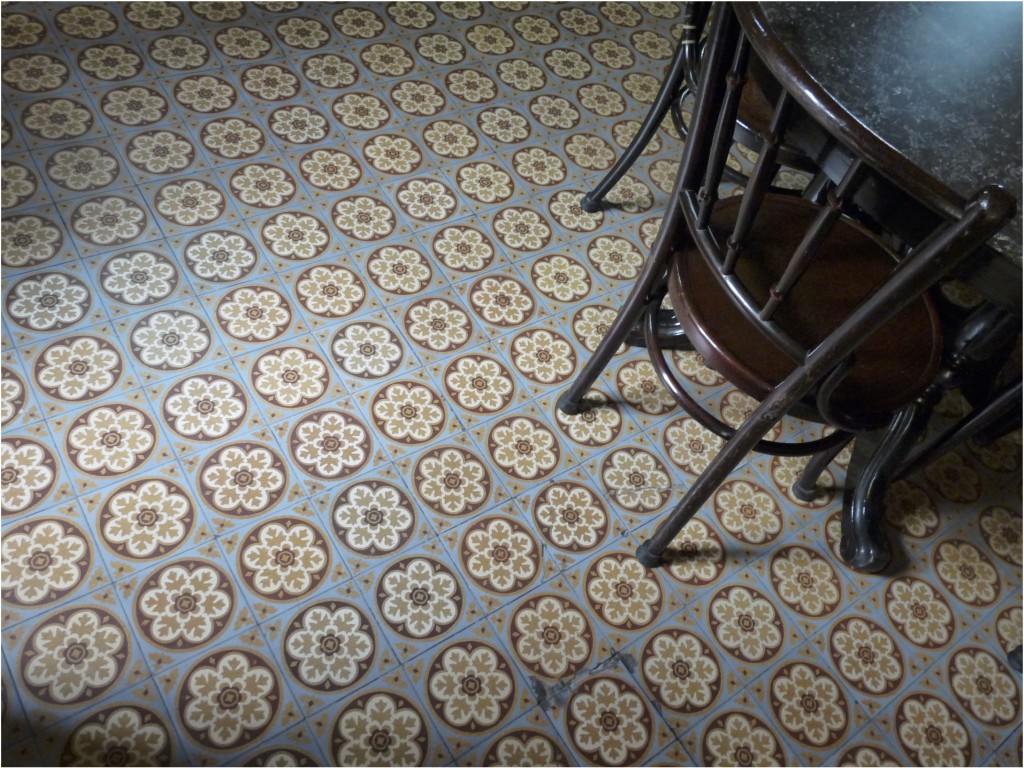
Picture (6): Beautiful old tiles still shine through the ages. Can we create lasting images of positive aging together?
图6:漂亮的地砖经多年后仍绽放着光彩。我们是否也可以共同创造积极老龄化的情景?
If I were to ask again, what does ageing mean to you and me? Very likely positive and negative images of aging might still come to mind. But it need not continue to be so. We can create beautiful pictures of positive ageing together—images that will continue to shine through the decades, like the beauty of old tiles that have withstood the passage of time.
若再问你:老龄化对你我来说是什么?各种各样的正面或负面的投影将浮现在我们的脑海里。但这可以被改变。你我可以共同创造出积极老龄化的美好情景、经过无数个花开花落后依然动人的画面。正如精致的地砖以及这张木椅,经历了时间的磨练仍然风采依旧。
But it must start from you and me, in the here and now.
但改变从你我开始,而起点在此时此刻。
译/彭彩鳳

